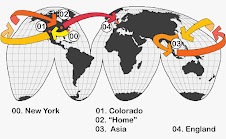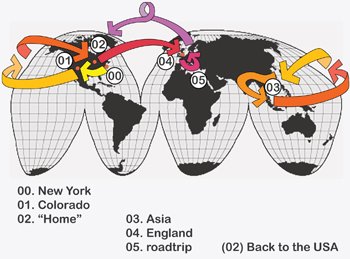I briefly went shopping over Christmas break. Along with getting slightly overwhelmed by the selection process, the amount of choice, and parting with money only recently re-earned, I found myself looking at the labels of almost every garment I tried on. In the past, I often looked to see where my clothes were made after I had purchased them or worn them half a dozen times. This time, I thought of the Bangladeshis and Cambodians and Chinese and Nepalese that made the clothes I tried on. I don't think my tag-checking directly affected my purchases, though. I had little time and money to waste on my already faintly tedious decision-making process. But I am wondering if I should change that...
Read the rest...
I think we used to hear the slogan "Buy made in America" a lot more than we do these days. Maybe that's because it's increasingly more difficult to do so. I think in general Americans (and British from what I can tell) agree that it's good to buy products made in their own countries. They might also agree that the quality of the goods is probably higher. But I remember listening to a man rant about Chinese-made shoes a few years ago and feeling like his tirade bordered on racial discrimination. Josh and I were both present and both left feeling a bit uncomfortable. He was more upset about quality than anything else, but maybe there's more to it. Josh also had people come to him when he worked at EMS asking what they had that wasn't made in China. Apparently, this is more wide-spread than I thought. With all the Chinese product recalls in the USA lately, perhaps I shouldn't be surprised.
There seems to be a new-ish buy local food craze, but what about clothing? Can anyone afford to fill their wardrobe with only American-made clothes? Should we want to? What about the energy it takes to ship all that material from country to country and then to ship those shirts and socks and blue jeans to the other side of the world? What about giving developing countries a much-needed source of income? Or are we just encouraging sweatshops in far-off lands?
On our trip, we encountered huge clothing centers in Phnom Penh, Dhaka, and Kathmandu. They would sell clothes with familiar labels like Gap, H&M, Levis... We had neither time nor money to shop in Cambodia or Bangladesh, but I did pick up two light-weight cotton replacement shirts in Nepal. I think they have Aeropostale labels in them, but obviously they never made it to the actual shops.
Last night, Josh and I listened to a podcast of This American Life that included a segment about the Cambodian garment industry. During the Clinton era, Cambodia was given garment trade privileges in exchange for decent working conditions. The result was a boom in the Cambodian garment industry (explaining the huge clothing centers we encountered), along with 8 hour work days, fresh water, nursing mother breaks, etc. However, with the end of the prioritized agreement came increased pressure to succumb to typical developing nation working conditions in an effort to compete for business. I find myself caring more about the Cambodian plight because I've been there, but I suppose there are dozens of other countries struggling with similar issues. I did find it interesting that Cambodia is losing business to Vietnam and Thailand where the clothing can be made cheaper due to worse working conditions, despite their slightly better-off economies. Also interesting: the Cambodian garment industry representatives are perhaps more familiar with the current presidential candidates than I am simply because the lives of thousands of workers depend on trade agreements I've never heard of. Also, if the current limits on Chinese garment imports expire as they are set to do in the next few years, the Cambodian industry will suffer, losing huge percentages of the trade.
What am I trying to say? I guess I am just asking questions. How can I, as a rich American, seek out cheap clothing knowing what conditions the person who sewed it might be working under? How can I, as the sole earner for a husband who pays very high international tuition, not seek out cheap clothing? And do my clothing choices really make a difference? Should I avoid a "made in China" label? Can I shun an entire country's products over another's? How do I know what to look for anyway?
Unfortunately, I think it comes down to money. And maybe taste. Both Josh and I like the idea of eating more local food, but money has been tight since we spent it all on traveling, and local can mean more money (yes, I know, not always. But it rarely seems cheaper). We also have talked about how we wouldn't be willing to give up things like chocolate or coffee if we couldn't find them locally grown/made. I think the same is true for clothing. I don't know that I have the time and money to investigate all my purchases, and I don't know if I'd find items to suit my tastes if I went only local. Also, I like knowing that I may be supporting an entire Cambodian family by giving work to a young woman who pays her brother's school tuition (another topic...). I suppose one thing I can do is frequent stores and labels who make an effort to buy garments from reputable factories with decent working conditions (although I can't help but point out that even a fairly grown banana takes an awfully lot of petrol to get to your grocery store- what about a cambodian shirt?). Obviously, cottage industries and those small shops are a great (and expensive) way to support growing economies. I guess it's like fair trade for clothing.
(what a confusing world.)
So. Anyone have any recommendations? Shops? Websites? Thoughts?
Thursday, January 31, 2008
You are what you... wear?
Posted by
megfeen
at
10:42 PM
![]()
Subscribe to:
Post Comments (Atom)


4 comments:
For me, working with the women while simultaneously becoming more concerned with the environment has raised the same dilemma. I've seen both ethical shops and those that leave a lot to be desired here. I want people to be able to make a good living no matter what and I know that the world is economically unfair with the West holding such a large portion of the world's finances. However, what type of world am I leaving to my children if I don't do everything I can to reduce our country's dependence upon oil. The way to bring about change in the market is to change your buying habits. The market will follow. But that means that the first people in the new line bear a large brunt of the financial responsibility for changing the market. I guess I have nothing for you except someone who gets how you feel.
Maybe Gandhi had it right. Maybe India should take of India, and Cambodia of Cambodia and the US of the US. We need only make that which we need, rather than the excesses supported by industry today. Seems obvious, no?
I was on a tour of Fort Sumter a few months ago, and during one of the reenactments, I was looking around at all the baby boomer's shoes. I noticed that more than 3/4 of them were New Balance athletic shoes. New Balance shoes, as you might know, are one of the very few shoe brands made in America. Since then, I've only worn my 766 New Balance shoes and found that you really don't need others. I've been able to donate all my other shoes to Goodwill.
I'm thinking even if I lived in Hershey, PA I'd still have to get good chocolate from Europe. :)
It does seem silly to shun outright the amazing possibilities globalization has given us- european chocolate in the USA, oranges in January, even Cambodian-made trousers...
I guess it's about balancing between all those things.
And being the spend-thrift I am, I find it difficult to bear that brunt, Elizabeth! I'm learning, though. Plus I don't know how long Josh and I can keep saving every penny only to spend it again in one big traveling go. I suppose you really do have to put your money where your mouth is sometimes.
Post a Comment